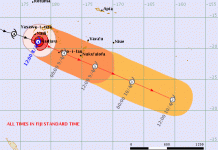The New Zealand Immigration and Protection Tribunal has allowed a Tongan couple to stay in the country.
In its ruling the Tribunal said the couple and their children had demonstrated exceptional humanitarian circumstances which would make it unjust or unduly harsh for them to be deported from New Zealand.
The parents had been living in New Zealand for 11 years. Their four children were all born in New Zealand.
The husband’s parents were New Zealand permanent residents.
The husband arrived in New Zealand in July 2008. In Tonga, the wife was employed as a teacher. They married in New Zealand in January 2009.
The couple held work permits until 2009 when the wife was granted an Essential Skills work visa to work as a teacher’s aide for a Pacific church school and the husband held a concurrent work visa as her partner.
In November 2010, Immigration New Zealand declined to renew the wife’s work visa as it was not satisfied that her employer had made a genuine attempt to recruit a New Zealand citizen or resident for her position. She and the husband were granted visitor visas for one month.
The appellants became unlawfully in New Zealand in December 2010.
Over the following years the couple lodged a number of appeals and applications to allow them to stay, but each was declined.
In March 2019 they were given leave to stay so they could lodge humanitarian appeals.
The couple said that as an infant their son was hospitalised with meningitis which led to mental retardation and learning delays. He also suffered from asthma and eczema. His key problem was mental retardation and joint disorders with mobility issues. This had not prevented him from attending a mainstream school with only modest support.
However, he needed ongoing specialist reviews which would not be available to him in Tonga. To develop his full potential, he needed to be able to access specialist services.
The Tribunal was told that the husband’s parents were New Zealand residents. They relied on the couple for help with daily living.
The husband had no house or land in Tonga and the wife’s parents lived in church properties.
The Tribunal was told the family was well-settled in New Zealand. The wife contributed significantly to her local school community and the husband was making a major contribution through his employment for a company that makes wastewater treatment systems.
If the appellants were deported to Tonga, the four children would be deprived of safe housing, health facilities and the standard of education they are currently receiving in New Zealand. The dependent children had spent their entire formative years in New Zealand, which was the only country they could call home. Their well-being would be at serious risk in Tonga where there was no safe housing available for them. The best interests of the children would be served by remaining together with their parents in New Zealand.
“The Tribunal finds that the appellants’ settlement here over the past 11 years, the special needs of their son, the best interests of all their children in remaining in their settled life in New Zealand and the dependency of the husband’s New Zealand-resident parents on the emotional and practical day-to- day support provided by the appellants cumulatively give rise to exceptional humanitarian circumstances,” the report on the case said.
“Weighing the appellants’ unlawful stay against the exceptional humanitarian circumstances, most particularly the detriment to the son’s education and development and the needs of the husband’s New Zealand-resident parents, the Tribunal finds that it would be unjust and unduly harsh for the appellants and their children to be deported from New Zealand.
“The Tribunal orders that the appellants and their children be granted resident visas.”







